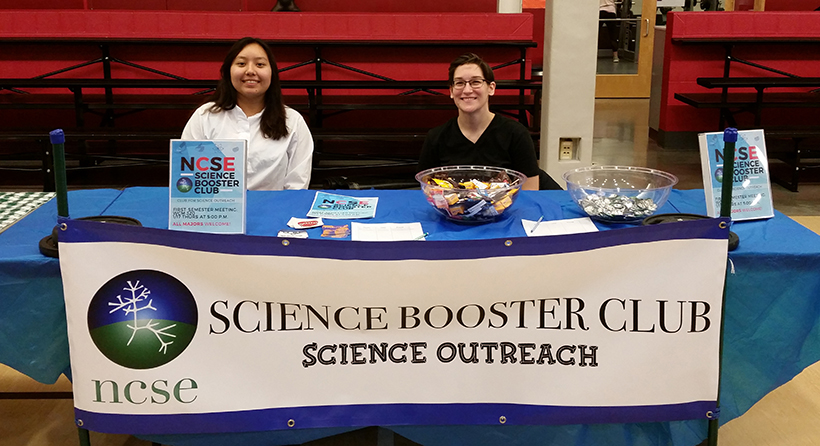The first ever student-led chapter of the National Center for Science Education (NCSE) has started at the University of Central Missouri.
The club was founded by Laurie Luckritz, the program leader and a first-year biology graduate student. Luckritz said NCSE is a non-profit, science booster club which is intended to offer science outreach without pushing political agendas, it’s all science backed.
“They usually choose to let science booster clubs occur in states or communities that have a lot of resistance to climate change and evolution,” Luckritz said. “They want to get those issues more talked about and out there so that we can make better choices in our voting.”
When founding the club, Luckritz said she took a different approach. She wanted to empower college students to share information and be in leadership positions, while also connecting them to science education in different ways.
Luckritz’s advisor, Kate Carter, director of community science education, said college students have the knowledge and energy to get the information across.
“We get to help them with infrastructure and interpretation skills but otherwise get to watch them develop a unique club that is right for their community,” Carter said.
Luckritz said NCSE sends approved material and offers non-conflict training to help keep possible conflicts about climate change and evolution to a minimum.
“For our initial year, we get funded by NCSE so they have the (activity) kits pre prepped for us and they will mail us the kits with instructions,” Luckritz said.
“They have kits for any age range. Their main focus right now is more toward kids and parents wanting to get their kids interested in the sciences,” Luckritz said.
A unique aspect of this club is it brings science to the community.
“Many people won’t seek out science activities on university campuses but will happily engage with scientists that come to their farmers markets, or their festivals,” Carter said.
Luckritz said the club will be working with Powell Gardens, farmer’s markets, summer camps and the school district to help spread awareness on the topics of evolution and climate change.
Alicia Carbajal, vice president and sophomore biology major, said “(It is) especially for the younger generation because they are the future. Understanding the world around us is a major part in how we make decisions. This club may help influence those decisions for the greater good, or at least give a different perspective.”
Luckritz said when she was an undergraduate, she was fascinated with evolution. At first she wanted to disprove it.
“I had a lot of my own issues to work with through and I didn’t understand it,” she said. “Once I did understand it, I wanted to help other people get exposed to it, at least be able to talk about it without having to get in fights.”
Carter said one issue many career scientists run into is lack of engaging the public because they don’t feel they have the skills.
“With so many science misconceptions in existence today, upcoming scientists must find ways to communicate effectively with the public,” Carter said. “Scientists that receive practice in these skills early in their training are more likely to make it a part of their careers.”
Luckritz said people don’t have to know a lot about science to get involved.
“Some of our biggest enthusiasts have been people that aren’t in the sciences at all,” Luckritz said. “We are very supportive of working with people according to how much they want to contribute.”
Luckritz said they have opportunities for crafting, needs for brainstorming, outreach and for people to talk about their information.
“I look forward to getting new members and doing events with the kids and getting them interested in the sciences,” Luckritz said. “A lot of times you grow up and you don’t know what all is out there, and I think that at the very least, this organization can help kids think about things they really liked doing when they were younger and how they might want to do stuff in the future.”
Club meetings take place every other week at 5 p.m. on Thursdays in W.C. Morris Room 320. The next one is Thursday.
They will be hosting a table at the Volunteer Fair from 11 a.m. to 1 p.m. on Feb. 13 in the Union Atrium.
You can find out more information about their club and make donations by visiting their Facebook page.



Leave a Reply